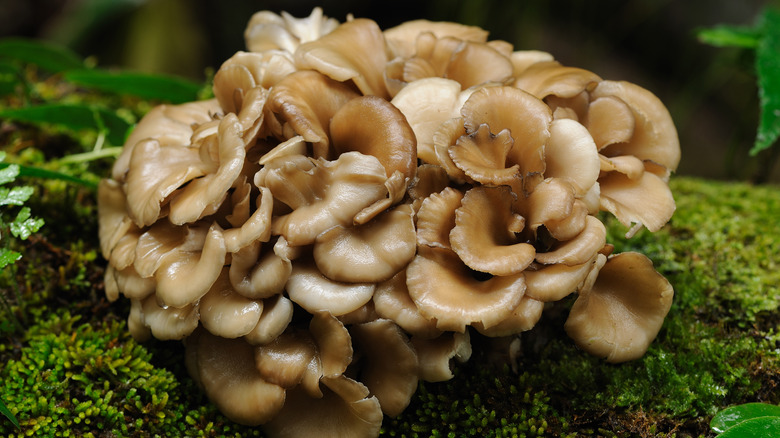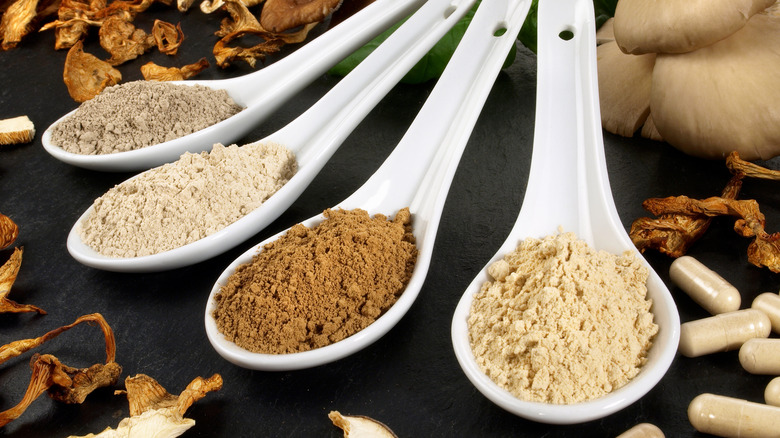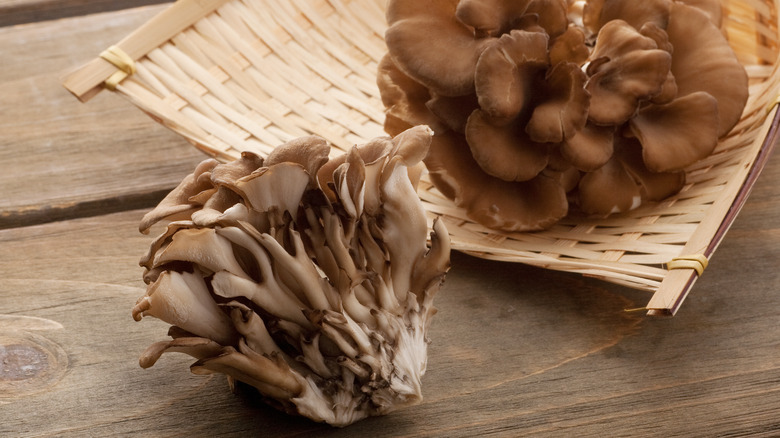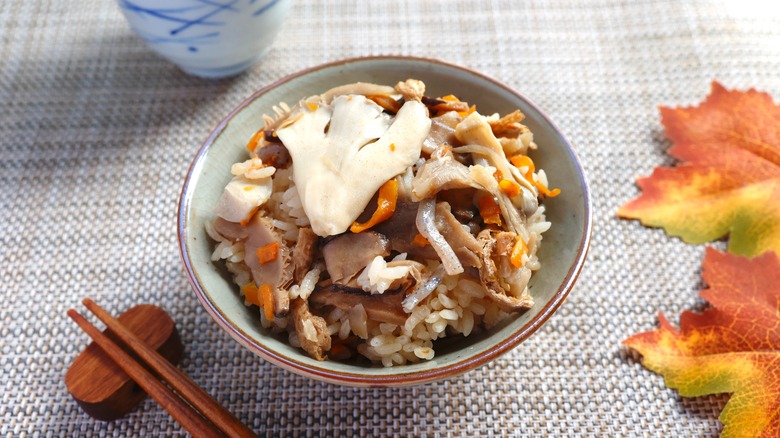Unexpected Health Benefits Of Maitake Mushrooms
Mushrooms are everywhere. We put them on our pizza. We add them to sauces and salads. We can even grill them and eat them on a bun like a hamburger. But the species of mushrooms we eat are just a tiny fraction of mushrooms all over the world. Researchers have identified more than 2,000 species of mushrooms, yet only 25 are considered food, according to a 2015 article in the International Journal of Microbiology.
Mushrooms have bioactive compounds that can improve our health. The polysaccharides in mushrooms boost our immune system and inhibit the growth of tumors. Most of the polysaccharides in mushrooms are beta-glucans, which also have antioxidant, neuroprotective, and cholesterol-lowering properties. The polyunsaturated fatty acids in mushrooms reduce cholesterol, and the tocopherols also are antioxidants. Mushrooms also have sterols, which help prevent cardiovascular disease.
The maitake mushroom grows at the bottom of trees in Japan, China, and North America. It's considered an adaptogen, which helps our bodies fight disease while regulating any imbalances. Although the maitake mushroom might be hard to find in your local grocery store, you can find them sold as supplements for their medicinal properties. The maitake mushrooms have specific ingredients that have research-backed health benefits that might make you add them to your diet.
Prevents the spread of cancer
When researchers study the effects of maitake mushrooms, they typically will extract a specific element to investigate, particularly since much of the research has been conducted using research animals or specific cells. A 2016 study in Nutrition and Cancer extracted D-Fraction, which is a beta-glucan found in maitake mushrooms. The researchers found that D-Fraction makes breast cancer cells less aggressive and less likely to metastasize.
The D-Fraction polysaccharide can also work with vitamin C to fight cancer. In a 2017 study in Integrative Cancer Therapies, researchers treated liver cancer cells with D-Fraction and vitamin C to find that they work together to kill the cancerous cells. The D-Fraction from maitake mushrooms works to prepare the cells for the antitumor punch of vitamin C.
Another polysaccharide found in maitake mushrooms is GFP-A. According to a 2020 study in the International Journal of Biological Macromolecules, GFP-A can reduce the spread of colorectal cancer cells.
Improves the immune system
The beta-glucans in maitake mushrooms also regulate the immune system and reduce oxidative stress. In a 2012 study in Food and Agricultural Immunology, researchers extracted and purified a specific beta-glucan from the maitake mushroom called MT-beta-glucan and injected it into mice that were modified to simulate the aging process. The MT-beta-glucan promoted healthy immune responses and suppressed destructive immune responses. The researchers also found an anti-aging effect through the MT-beta-glucan's antioxidant properties. Because the MT-beta-glucan reduced oxidative stress, it improved the memory and motor functions of aging-induced mice. The researchers pointed to both the free radical theory and immunological theory of aging for why the aging-induced mice saw improvements.
Researchers also found that the GFP-A polysaccharide in maitake mushrooms helps modulate the immune system in a 2016 study in Food & Function. The GFP-A polysaccharide stimulated the toll-like receptor 4, which serves on the frontlines in preventing infections in the body, to fight off leukemia.
Manages diabetes
Maitake mushrooms can help with diabetes. A 2015 study in Food & Function extracted two fractions of polysaccharides, F2 and F3, to test their effect on blood sugar. These polysaccharides in maitake mushrooms lowered fasting serum glucose and fasting serum insulin compared to the control group. They also increased insulin receptors and improved insulin resistance.
Another compound in maitake mushrooms, ergosterol peroxide, might help manage glucose levels. According to a 2020 study in the Journal of Ethnopharmacology, ergosterol peroxide helped process glucose while reducing harmful reactive byproducts in the metabolic process.
The polysaccharides in maitake mushrooms might protect the kidney function in people with diabetes. A 2020 study in the Journal of Food Biochemistry investigated the mushroom's ability to control blood sugar and prevent the progression of kidney failure in rats. The polysaccharides reduced not only blood sugar and the inflammation response but also the biomarkers for kidney disease.
Reduces cholesterol and hypertension
The fiber in mushrooms can lower cholesterol. A 2016 study in Society for Experimental Biology and Medicine fed rats a cholesterol-free diet supplementing with either cellulose powder, fiber from the maitake mushroom, fiber from the shiitake mushroom, or the enokitake mushroom. After four weeks, the total cholesterol levels were lower in the maitake and enokitake mushroom conditions. Another 2016 study in Frontiers in Microbiology fed rats a high-cholesterol diet and added maitake mushrooms to one group. The group that was fed the mushrooms had considerably lower cholesterol levels. The researchers concluded that the maitake mushrooms regulate 20 proteins in the liver that reduce cholesterol.
A 2010 study in the International Journal of Medical Sciences used commercially-available fractions of maitake mushrooms — Fractions XS and D — to test their effect on blood pressure in rats. The results showed that both fractions of the maitake mushroom lowered blood pressure as much as captopril and niacin-bound chromium, which are two other treatments for hypertension.
Improves gut health
If you're still not convinced about the health benefits of maitake mushrooms, how about improving your gut microbiota? Yep, these little fungi might work magic on the health of your gut. A 2019 study in the International Journal of Molecular Sciences fed rats a high-fat diet and supplemented some with a concentrated powder of the maitake mushroom. The rats that had the maitake supplement didn't gain as much weight after four and eight weeks. The mushroom also balanced specific strains of microbes in their gut. The researchers concluded that this balance is key to preventing liver disease and some cancers while boosting the immune system.
According to a 2019 study in Food and Chemical Toxicology, the heteropolysaccharide GFP-N has sugar residues that decrease insulin resistance and fasting blood glucose levels in diabetic mice. How does this happen? This polysaccharide gave the gut microbiota a healthy boost to improve the health of diabetic mice.






